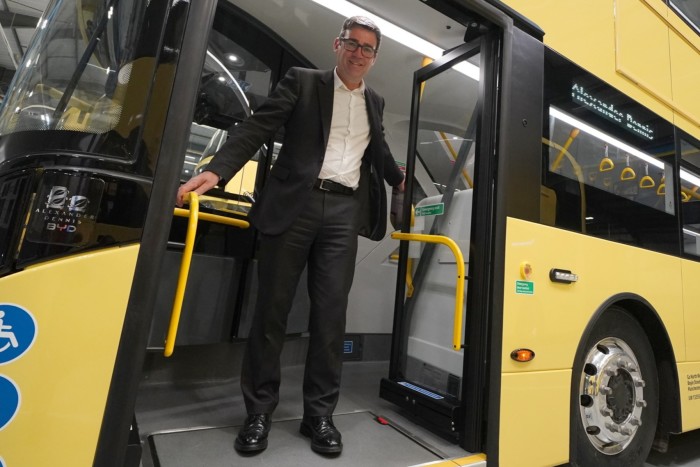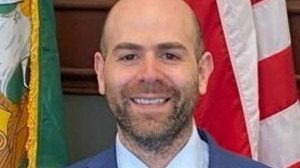Manchester mayor hails bus reform but rural leaders lukewarm

Speaking on an electric bus at a depot in Manchester earlier this month, Andy Burnham hailed a “big moment” in the future of public transport outside of London.
From January 5, the conurbation’s entire bus network will come under public control for the first time in nearly four decades.
Greater Manchester will become the first place in England to fully re-regulate its network, in a three-stage overhaul that has taken control of timetables, fares and routes and has already boosted patronage, frequency and reliability.
“It’s probably the biggest change to buses that this country has seen in a long, long, long time,” said the Greater Manchester mayor.
Ministers hope their new buses bill, introduced in parliament on Tuesday, can generate the same sorts of improvements across England.
They want to extend franchising powers currently only available to Burnham and other metro mayors, so all local authorities can once again dictate where and how buses are run.

However, the amount of money attached to the reforms will not be known until the government’s Comprehensive Spending Review in June, creating uncertainty over how extensively or quickly English networks will actually be reformed.
In 1986 all bus networks outside of the capital were deregulated. Since then, ridership beyond London has been in sharp decline. The Labour government believes that franchising can reverse that trend, improving living standards and growing local economies in the process.
But the money available nationally for the process remains unclear. The areas already undertaking franchising have raised substantial local funding in order to do so.
In Greater Manchester, the process will have cost £134mn by next year, raised in large part through local taxation and borrowing. That has paid for transition costs, upfront capital purchases and new staff.
But local leaders believe the improvements have proved worth the expense.
“The fare box on the network is 9 per cent above what we budgeted for, patronage up 5 per cent,” said Burnham of those services brought under his control over the past two years.
Around 80 per cent of services are now on time, said Transport for Greater Manchester, compared to 69 per cent when the network was deregulated.
“We are on time and on budget,” added Burnham. “It’s a really, really good story.”
Mayors in other places with major cities such as West Yorkshire and Liverpool are all already following Burnham’s lead by using previous legislation to franchise their networks.
In all cases, the process is expected to cost hundreds of millions of pounds. Some are planning to raise money for reform through local tunnel or bridge tolls, as well as through borrowing and cross-subsidy from light rail networks.
However, beyond the cities, finances can be hard to stack up.

“I think what’s happening at the moment in local authorities across the country is people are saying to themselves: ‘is it worth it in our particular circumstances to incur that sort of scale of cost?’” said Graham Vidler, chief executive of the Confederation of Passenger Transport, a sector body.
Greater Manchester’s process had been a “success”, he said, but added that places with sparser populations and less expertise may choose to continue with existing “enhanced partnership” arrangements.
Under that model, agreements are drawn up with operators, but local politicians do not directly control fares or routes.
East Midlands mayor Claire Ward has already decided to stick with that system after being elected in May. Her area includes several small cities as well as rural communities.

Burnham had made “fantastic” improvements to his network, she said, but the process had taken him two mayoral terms to pull off due to the complexities of the process.
“I don’t think even he would say it’s come without considerable costs and challenges,” she said. “I felt that the region needed to have something more than that quickly.”
Ward instead plans to continue in partnership with operators, initially favouring the “carrot” rather than the “stick” to tease out improvements to services.
“I’ve made it really clear that if you don’t co-operate,” she added. “I’ll move towards franchising.”
The East Midlands also lacked the existing transport expertise to go immediately into a franchising process, she said.
Experts point to lack of capacity more widely across local government as a major obstacle to full re-regulation.
Transport for Greater Manchester has long-standing knowhow in setting up and running complex projects. But that is not the case everywhere, said Andrew Carter, chief executive of the think-tank Centre for Cities.
“Talking to transport colleagues, setting up the system is hard and lack of people with experience of running franchised systems will hold places back,” he said.
Institutional capacity is “perhaps the most important thing” in successful re-regulation, said Vidler, adding that since 2010, local transport departments have been “hollowed out”.
“You don’t need to go very far down the local authority scale to find that the public transport department is one person,” he added. “It’s a huge challenge.”

Still, ministers have promised the greatest overhaul of bus services “in a generation”.
The move “will bring an end to the current postcode lottery by taking steps to improve bus services no matter where you live”, then-transport secretary Louise Haigh said when the plans were unveiled in September.
Local leaders will now wait to see what funding is attached.
Vidler cites recent research by the transport analyst Chris Cheek, which found that it would cost the taxpayer £1.6bn a year just to return services to their pre-Covid levels.
“In a way, the big bus story over the next year is not going to be the buses bill,” said Vidler. “It’s going to be the spending review next June.”
Data visualisation by John Burn-Murdoch
#Manchester #mayor #hails #bus #reform #rural #leaders #lukewarm






